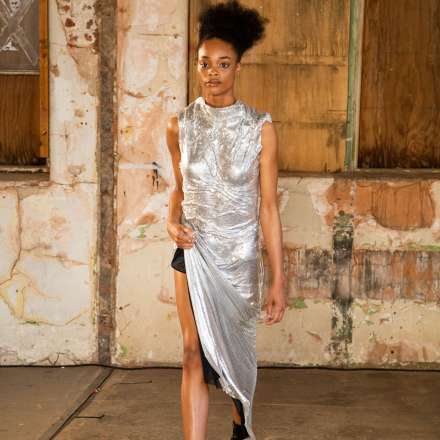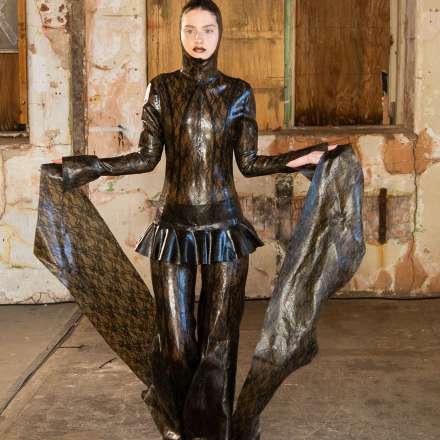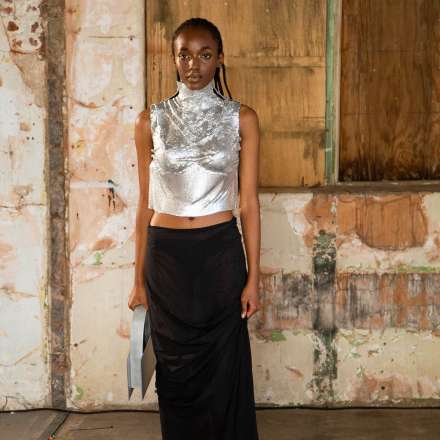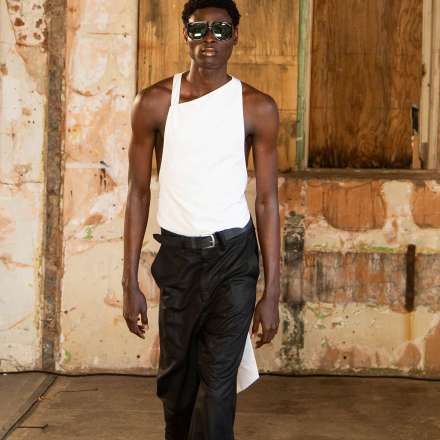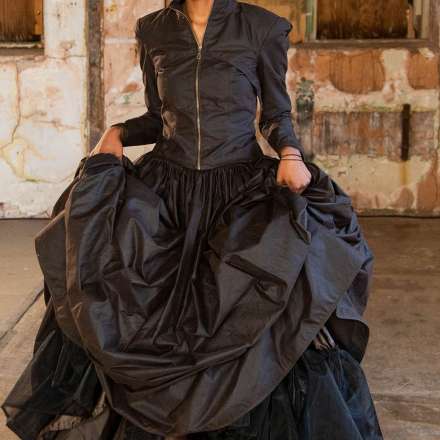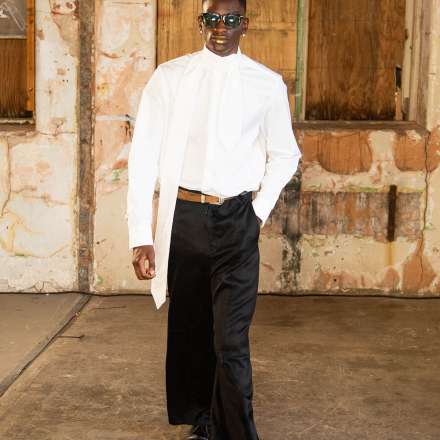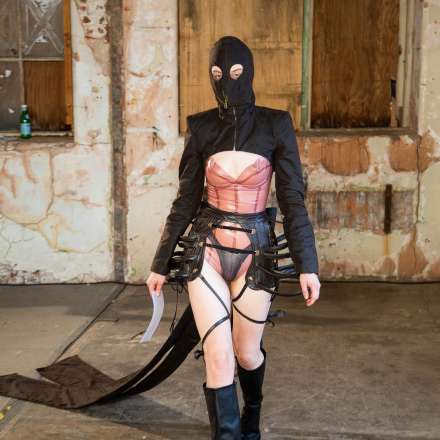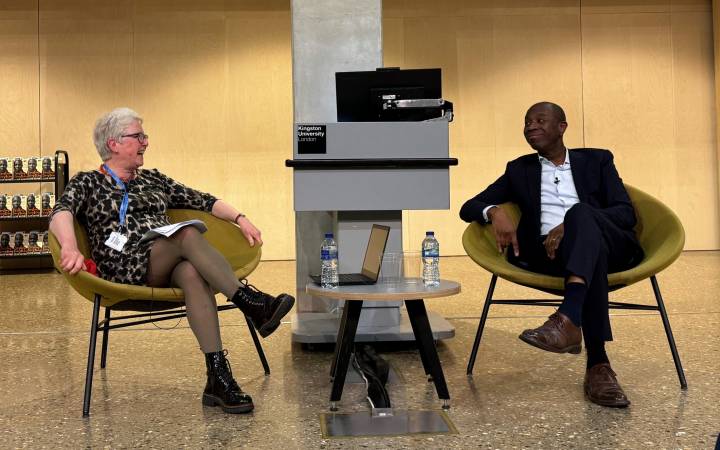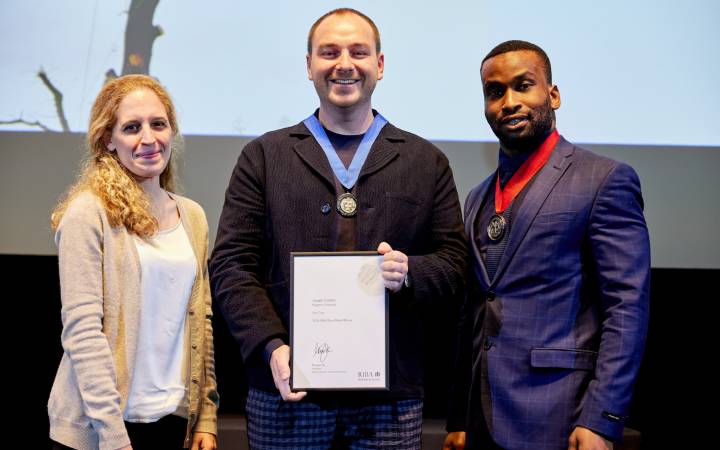Kingston School of Art fashion students debut graduate collections made from chainmail, latex and repurposed denim at central London catwalk show
Posted Tuesday 13 June 2023
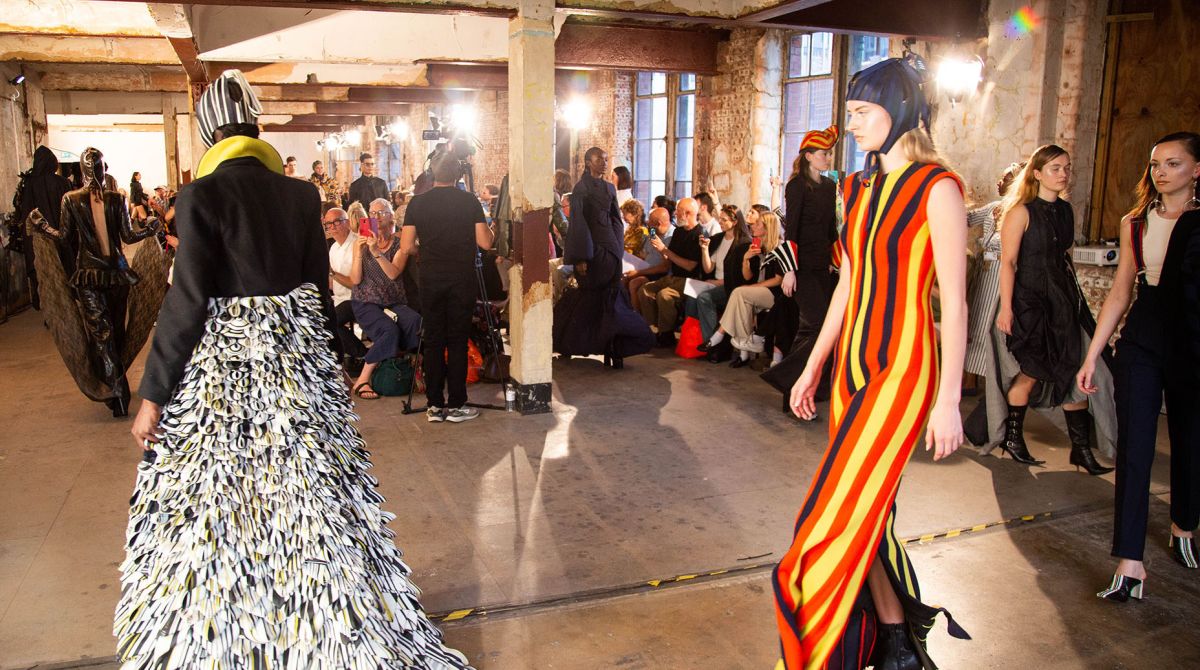 Kingston School of Art's BA (Hons) Fashion show took place at Oxo Tower Wharf in London.
Kingston School of Art's BA (Hons) Fashion show took place at Oxo Tower Wharf in London.
Gender equality, explorations of ancestry and the use of clothing to embrace sexual identity were some of the inspirations behind final-year collections which hit the catwalk at this year's Kingston School of Art BA (Hons) Fashion show.
A group of 21 talented designers unveiled their work to an invited audience of industry and press within the atmospheric surrounds of the Bargehouse, Oxo Tower Wharf in the heart of London's South Bank area on Monday 12 June. The show was hosted by fashion industry icon, commentator and visiting professor Caryn Franklin MBE, herself a Kingston University graduate. Five students won awards sponsored by the White Company during the show, which were handed out by Clothing Director Barbara Horspool.
Among the designs from this year's cohort of graduating students is Charles Francis Hemsley's collection, which was named the winner of the outstanding menswear collection award on the night. Titled the tender side of queerness, it aims to challenge traditional menswear clothing norms by creating wearable designs for the gay community.
"My collection draws on both the pain and beauty of being a queer man," Charles explained. "I wanted to create something that expresses the inner strength and vulnerability that comes with embracing one's sexual identity, while at the same time make men feel empowered and want to wear clothing with non-traditional masculine detailing such as open back tops."
His eight looks, made predominately out of repurposed or recycled fabric, draws on inspiration from Hal Fisher's Gay Semiotics, a series of photos that documented the clothing and identity of the gay community in San Francisco during the 1970s.
Charles portrays hidden meanings alluding to the history of queer dress throughout his own collection. Loops on which handkerchiefs can be tied are a feature of his denim designs, in reference to the Hanky Code, a system which features in Fisher's photos where coloured handkerchiefs were shown hanging from pockets by gay men to indicate their sexual preferences.
Meanwhile, a jacket made from deadstock silk dupion fabric is named The Pansy after the work of Paul Harfleet, an artist and activist who has planted pansies at the sites of homophobic incidents across the world.
Personal identity and an exploration of her family's heritage are the inspiration behind Venetia Williams' designs, who won the award for outstanding 3D design. Her collection explores the ancestry of eccentric artists on her mother's side and a desire to break away from the military formalities and politics on her father's side.
Her six-look collection, which incorporates both menswear and womenswear, features a statement dress made entirely from individually manually linked aluminium chainmail, which she solidified by pouring metal pewter between the rings.
"The idea was to replicate a similar aesthetic to my family kitchen which my mother cladded in checker plate aluminium," Venetia explained. "It almost resembles armour with its solid metal appearance, while the fluidity of the garment defies the strait-laced formalities of my father's heritage."
This contrast between solid aluminium and fluidity features prominently throughout her collection, including a body tight aluminium chainmail top attached to a lightweight skirt made from 100 per cent georgette silk.
A further highlight among this year's collections is a womenswear collection called hysteria by Becky Womersley, which draws on her research into the history of female objectification.
"I combined elements of bondage wear with silhouettes from the Victorian ages, as references to how women have been objectified and sexualised throughout history," Becky explained. "By giving these designs a modern spin in my collection, I wanted to send a powerful statement that challenges traditional norms, empowers women and opens up conversations about gender equality."
Becky experimented with complex techniques to produce the seven looks within her collection. One of her statement pieces is a one-piece suit, made by layering multiple coats of hand painted latex with lace. Another features a waxed cotton skirt supported by a bustle, typically used as a padded undergarment in the 1800s to add fullness to dresses, which she made by hand-sewing steel boning.
BA (Hons) Fashion course leader David Frizzell said the fashion show acts as an important launchpad for the designers' future careers, as well as providing valuable links to industry. "The show is a celebration of our students' achievements and the culmination of years of hard work," he said. "It helps us to reach a global audience of industry experts. This year's cohort have demonstrated exemplary technical skill, innovative problem solving and high levels of creative design all of which will help them to kick start their graduate careers in fashion and compete with the best."
- Find out more about studying Fashion BA (Hons) at Kingston School of Art.
Contact us
General enquiries:
Journalists only:
- Communications team
Tel: +44 (0)20 8417 3034
Email us

